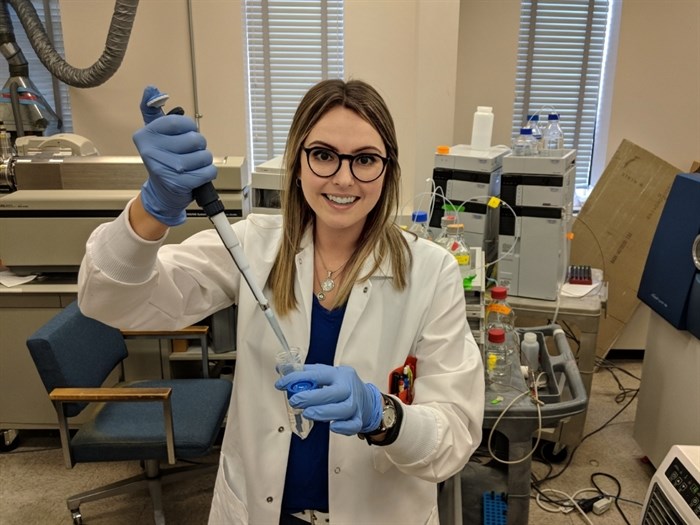
There's no need to pee in pools, says Lindsay Blackstock, a doctoral student from Kamloops studying at the Univesity of Alberta. Her recent study into measuring how much urine is in the average swimming pool is gaining national attention.
Image Credit: SUBMITTED/Lindsay Blackstock
June 20, 2018 - 6:30 PM
KAMLOOPS - There’s a way to tell how much pee is in a swimming pool or hot tub thanks to a Kamloops doctoral student studying at the University of Alberta.
As it turns out, it’s not only gross but it can pose health risks to those who spend lots of time around or in swimming pools.
Before you decide to never step foot into a pool again, Lindsay Blackstock — the doctoral student behind the swimming pool and pee science — agrees it’s a gross thing to do to the people you're swimming with, but its almost completely avoidable.
In her study, Blackstock has been investigating the disinfection byproducts found in water. Disinfection byproducts are formed as a result of unintentional reactions between natural organic materials in water and the disinfectants used to ensure that water is safe, such as chlorine.
Blackstock’s research group, under the leadership of University of Alberta professor Xing-Fang Li, looked at the way components found in urine such as urea can react with chlorine in swimming pools.
“Urea, for example, is well known to react with say chlorine in swimming pools to form trichloramine,” she says. “Trichloramine is a gaseous compound and it's actually responsible for that chlorine smell you smell in indoor pools.”
Blackstock says this disinfection byproduct has been associated and linked with increased incidents of asthma.
“Long-term exposure to this compound that is formed is linked to increased incidents of occupational asthma, so like professional swimmers or pool workers,” she says. “It's also been found to be an irritant of the eyes, so it might give you red eyes when you go swimming for example.”
With this information in mind, Blackstock says her research group began to wonder if there is a way to look for this compound that would help indicate how much urine was in a swimming pool or hot tub.
The indicators they used to test for urine in several swimming pools and hot tubs in British Columbia and Alberta was testing for acesulfame potassium, also known as an artificial sweetener.
“Using artificial sweeteners as indicators of waste or human waste in water isn’t a new idea,” she says. “But the reason why I focused on acesulfame is because of the way it's excreted by the human body, it is at least 99 per cent (found) in urine."
Blackstock says they were able to find traces of acesulfame in every single pool and hot tub they tested.
"We investigated different swimming pools and hot tubs in B.C. and Alberta and we did, in fact, find that we were able to detect acesulfame in every single swimming pool and hot tub at elevated concentrations compared to the water used to fill the pools and hot tubs," she says. "So that indicates to us that this evidence that people are definitely peeing in pools because there is no other source for this acesulfame or artificial sweetener."
But there's one easy fix to this problem, Blackstock says, stop peeing pools.
"We don't want to discourage people from swimming at all, it's a great sport," she says, adding that growing up in Kamloops she was part of the local swim clubs herself.
"Unfortunately some of the main messages that the audience took from (this) research was that swimming is gross and (they) never want to go swimming again and that really shouldn't be the case," she says. "We really want to promote swimming and just acknowledge and highlight to the people that are swimming, if you just don't pee in the pool, it won't be an issue."
When people empty their bladders in a pool, it increases the chances of trichloramine forming.
"If you can just empty your bladder before you go into the swimming pool or make sure you go and use the toilet, it would be a lot nicer to your neighbouring swimmers, it's definitely something that can be avoided, we don't need to pee in the pool."
To contact a reporter for this story, email Karen Edwards or call (250) 819-3723 or email the editor. You can also submit photos, videos or news tips to the newsroom and be entered to win a monthly prize draw.
We welcome your comments and opinions on our stories but play nice. We won't censor or delete comments unless they contain off-topic statements or links, unnecessary vulgarity, false facts, spam or obviously fake profiles. If you have any concerns about what you see in comments, email the editor in the link above.
News from © iNFOnews, 2018